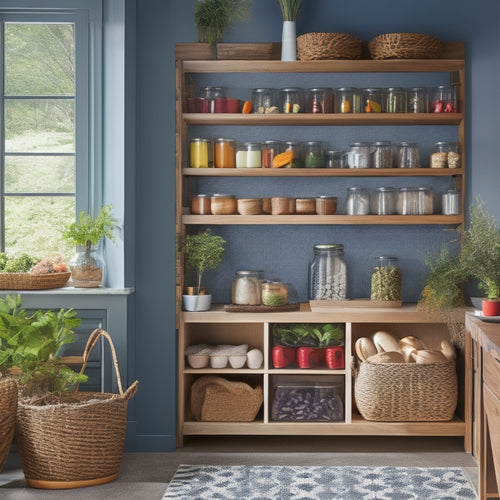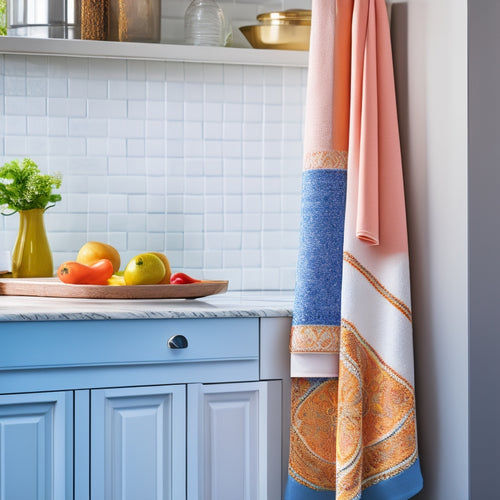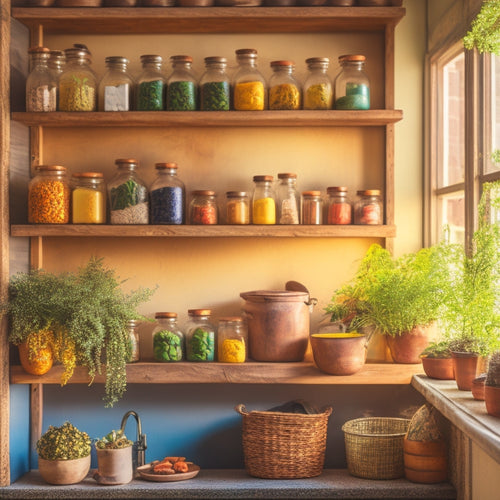
Elevate Your Kitchen Essentials Checklist Now
Share
A well-stocked kitchen relies on a curated set of essentials, carefully chosen to elevate cooking and baking experiences, ensuring that every dish that leaves the kitchen is a masterclass in flavor, texture, and presentation. To achieve this, focus on four key areas: accurate measurements and reliable cookware, efficient small appliances, versatile bakeware, and high-quality kitchen tools. Invest in a kitchen scale, thermometer, and timer for precise measurements. Choose non-stick pans, cast iron cookware, and Dutch ovens for cookware. Discover the must-haves in each category to reveal new culinary heights.
Key Takeaways
• Invest in a kitchen scale to ensure precise weights and ratios for accurate cooking results.
• Equip your kitchen with a thermometer to guarantee food safety and quality in every dish.
• Build a cookware collection that includes non-stick pans, cast iron cookware, and oven-safe pieces for versatility.
• Utilize small appliances like blenders, food processors, and stand mixers to streamline kitchen tasks and save time.
• Stock your kitchen with essential tools like high-quality chef's knives, utensil storage systems, and microplane graters for enhanced efficiency.
Weights and Measures Essentials
Accurate measurements are the foundation of successful cooking, and having the right tools for the job is essential to achieving precision and consistency in the kitchen.
Precision cooking demands accurate measurements, and investing in reliable measuring tools is critical. Measuring cups and spoons are essentials, but a kitchen scale takes ingredient measurement to the next level, ensuring precise weights and ratios.
A thermometer is also essential for perfect cooking temperatures, guaranteeing food safety and quality. A timer completes the set, allowing you to keep track of cooking times and multitask with ease.
With these weights and measures essentials, you'll be well on your way to mastering precision cooking and accessing a world of culinary possibilities.
Cookware for Every Occasion
Every kitchen needs an arsenal of versatile cookware that can tackle a wide range of cooking tasks, from searing and sautéing to simmering and braising. A well-stocked kitchen should include non-stick pans for easy cooking and cleaning, cast iron cookware for durability, and stockpots and saucepans for boiling and simmering.
Additionally, a Dutch oven provides versatility for stovetop and oven cooking. Don't forget oven safe cookware, perfect for shifting from stovetop to oven. Specialty bakeware, such as muffin tins and cake pans, is also essential for baking sweet treats.
Small Appliances for Big Tasks
From chopping and slicing to blending and mixing, a well-chosen array of small appliances can greatly streamline kitchen tasks, freeing up time and energy for more creative pursuits. These compact powerhouses can tackle tedious tasks with ease, ensuring that meal prep is a breeze.
Blenders and food processors are perfect for making smoothies, soups, and sauces, while also chopping and slicing ingredients with precision.
Stand mixers and immersion blenders are ideal for baking and cooking tasks, from whipping cream to blending soups directly in the pot.
With these small appliances, you'll be able to tackle even the most challenging recipes with confidence, all while ensuring a safe and efficient cooking experience.
Bakeware for Sweet and Savory
In the world of bakeware, a well-stocked collection of essential pieces is vital for tackling a wide range of sweet and savory recipes with ease. From sheet pans to tart pans, having the right bakeware is necessary for achieving perfect bakes.
| Bakeware Material | Pros | Cons |
|---|---|---|
| Glass | Non-reactive, easy to clean, and transparent for monitoring bakes | May break or shatter if dropped |
| Metal | Durable, conducts heat well, and often non-stick coated | Can react with acidic ingredients, may warp if overheated |
| Ceramic | Non-reactive, easy to clean, and aesthetically pleasing | May be prone to chipping or cracking |
| Silicone | Flexible, non-stick, and easy to store | May not be suitable for high-temperature bakes |
When selecting bakeware, consider the recipe, desired outcome, and personal preference to guarantee the best results.
Must-Have Kitchen Tools
Equipping your kitchen with the right tools can make all the difference in cooking and baking with confidence and efficiency. A well-stocked kitchen tool arsenal is essential for producing delicious meals and baked goods.
Here are a few must-haves to keep in mind:
-
A high-quality chef's knife that requires regular knife upkeep to stay sharp and effective
-
A set of utensil storage systems, such as a utensil holder or hooks, to keep your countertops clutter-free
-
A microplane grater, which is handy for zesting citrus fruits and grating cheese, and adds a touch of professionalism to your cooking routine
Frequently Asked Questions
How Often Should I Replace My Kitchen Utensils and Gadgets?
To guarantee kitchen safety and sustainability, replace utensils and gadgets every 1-3 years, depending on usage and quality, and opt for eco-friendly options like stainless steel, silicone, or wooden tools that promote longevity and easy cleaning.
Can I Use Metal Utensils With My Non-Stick Cookware?
As the sword of culinary mastery slashes through the kitchen, one must wield utensils wisely, avoiding metal's harsh edge on non-stick cookware, lest it be scratched and rendered useless, compromising cooking techniques and care.
Are Ceramic or Stainless Steel Cookware Better for Health?
When it comes to health, ceramic cookware is a safer choice due to non-reactive properties, whereas stainless steel can leach metals. Opt for ceramic over stainless steel, and glass over plastic for storage to minimize chemical exposure.
How Do I Organize My Kitchen Tools and Appliances Efficiently?
"Imagine a clutter-free kitchen where every tool and appliance has its designated spot. Achieve this harmony by implementing pantry organization systems, utilizing kitchen tool storage solutions, and scheduling regular appliance maintenance, all while incorporating space-saving designs for a safe and efficient cooking environment."
What Are the Must-Have Spices and Seasonings for a Beginner's Kitchen?
"For a beginner's kitchen, must-have spices and seasonings include salt, pepper, and herbs like basil and oregano, which create flavorful combinations when paired with cooking techniques like roasting and sautéing."
Related Posts
-

Sliding Pantry Storage Ideas for Renters
If you're looking to optimize your rental kitchen, sliding pantry storage solutions could be your answer. Employ vert...
-

Over-The-Door Kitchen Towel Holder
An over-the-door kitchen towel holder is a smart way to maximize your space while keeping towels easy to grab. It hoo...
-

Wall Racks for Storing Kitchen Herbs and Spices
Wall racks for storing kitchen herbs and spices are a revolutionary advancement for maximizing your kitchen space. Th...


